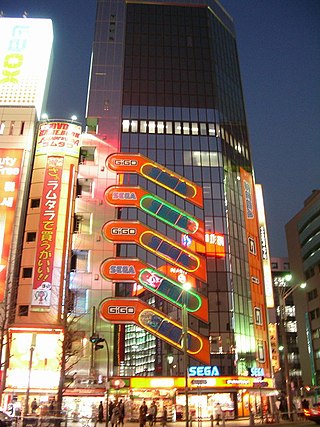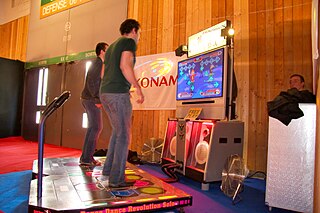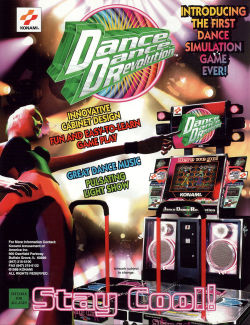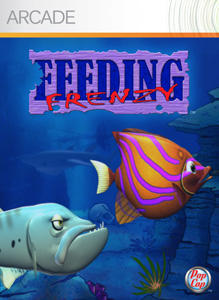Dance Dance Revolution (DDR) is a music video game series produced by Konami. Introduced in Japan in 1998 as part of the Bemani series, and released in North America and Europe in 1999, Dance Dance Revolution is the pioneering series of the rhythm and dance genre in video games. Players stand on a "dance platform" or stage and hit colored arrows laid out in a cross with their feet to musical and visual cues. Players are judged by how well they time their dance to the patterns presented to them and are allowed to choose more music to play to if they receive a passing score.

An amusement arcade, also known as a video arcade, amusements, arcade, or penny arcade, is a venue where people play arcade games, including arcade video games, pinball machines, electro-mechanical games, redemption games, merchandisers, or coin-operated billiards or air hockey tables. In some countries, some types of arcades are also legally permitted to provide gambling machines such as slot machines or pachinko machines. Games are usually housed in cabinets.
Bemani, stylized as BEMANI, is Konami's music video game division. Originally named the Games & Music Division (G.M.D.), it changed its name in honor of its first and most successful game, Beatmania, and expanded into other music-based games, most notably rhythm games such as Dance Dance Revolution, GuitarFreaks, and DrumMania.

Pump It Up is a music video game series developed and published by Andamiro, a South Korean arcade game producer.

In the Groove is a rhythm game developed & published by Roxor Games, and is the first game in the In the Groove series. The game was shown in an official beta-testing preview on July 9, 2004, and was officially released in arcades around August 30, 2004. A PlayStation 2 port of In the Groove was released on June 17, 2005, by RedOctane.

Rhythm game or rhythm action is a genre of music-themed action video game that challenges a player's sense of rhythm. Games in the genre typically focus on dance or the simulated performance of musical instruments, and require players to press buttons in a sequence dictated on the screen. Many rhythm games include multiplayer modes in which players compete for the highest score or cooperate as a simulated musical ensemble. Rhythm games often feature novel game controllers shaped like musical instruments such as guitars and drums to match notes while playing songs. Certain dance-based games require the player to physically dance on a mat, with pressure-sensitive pads acting as the input device.
Redemption games are typically arcade games of skill that reward the player proportionally to their score in the game. The reward most often comes in the form of tickets, with more tickets being awarded for higher scores. These tickets can then be redeemed at a central location for prizes. The most inexpensive prizes may require only a small number of tickets to acquire, while the most expensive ones may require several thousand. In general, the amount of money spent to win enough tickets for a given prize will exceed the value of the prize itself. Some redemption games, such as Flamin' Finger, involve elements of chance, which can be set by the operator.

Rampage is a 1986 arcade video game by Bally Midway. Inspired by monster films, players control a trio of monsters: George, Lizzie, and Ralph, humans transformed into creatures due to various experimental mishaps. The objective is to destroy cities and combat military forces while maintaining their health. The game is set across 128 days in cities throughout North America, with each cycle repeating five times. Gameplay includes destroying buildings, eating humans, and avoiding damage.

Dance Dance Revolution (DDR) is a music video game, developed by Konami, released in arcades on November 18, 1998, in Japan. Dance Dance Revolution is a unique game involving dance and rhythm that defined the genre. It is the first installment of the franchise of the same name. It involves timing and balance by having players use their feet instead of their hands like typical video games. In March 1999, the game was released for North American arcades, and for European arcades under the name Dancing Stage. Players and game critics were caught off-guard by the game's addictive qualities winning the new franchise many merits to its design.

An electronic game is a game that uses electronics to create an interactive system with which a player can play. Video games are the most common form today, and for this reason the two terms are often used interchangeably. There are other common forms of electronic games, including handheld electronic games, standalone arcade game systems, and exclusively non-visual products.

Dance Dance Revolution SuperNova, released in Europe as Dancing Stage SuperNova is an arcade and PlayStation 2 game in the Dance Dance Revolution (DDR) series of music video games. It was produced by Konami and released through Betson Enterprises. The game was released in Europe on April 28, 2006, followed shortly by a North American release in May and a Japanese release on July 12.

Feeding Frenzy is a single-player mode and arcade-style aquatic video game written by Sprout Games, and published by PopCap Games. With an initial debut on February 11, 2004, it saw a re-release on the Xbox Live Arcade service, with versions for both the original Xbox and the Xbox 360. The Xbox 360 version, released on March 15, 2006, was the 17th most popular Xbox Live Arcade title for 2006.
MAGFest is a 501(c)3 non-profit organization whose mission is to make the world a better place through video game art, music, and culture. They hold multiple events throughout the year, with their flagship event being an annual festival held in the Washington metropolitan area the National Harbor. The events feature concerts by chiptune artists and video game cover bands, educational panels and activities, free-to-play arcade cabinets, a bring your own computer (BYOC) LAN party, community jam spaces, and charity speedruns & auctions.

Dancing Stage featuring Disney's Rave is a music video game released in Japan in arcades on November 30, 2000. On the same day, it was also released for the PlayStation, but under the name Dance Dance Revolution Disney's Rave. It was later released in September 2001 North America as Dance Dance Revolution Disney Mix and in Europe and Australia as Dancing Stage Disney Mix. It is based on Konami's Dance Dance Revolution (DDR) series with animated Disney characters and electronic dance music remixes of past Disney songs. They also include a few non-Disney songs that were popular at the time of the game's release. It is considered to be one of the rarest DDR game released in arcades.

Red Dead is a series of Western-themed action-adventure games published by Rockstar Games. The first entry in the series, Red Dead Revolver, was released on the PlayStation 2 and Xbox in May 2004. Originally developed by Capcom, Red Dead Revolver borrowed elements from their 1985 arcade title Gun.Smoke, to which it was intended to be a spiritual successor, but the game was cancelled in 2002. Subsequently, after acquiring the rights, Rockstar purchased Red Dead Revolver and expanded on it.

Round One Corporation, stylized as ROUND1, is a Japan-based amusement store chain. In Japan, the amusement centers offer bowling alleys, arcade games, karaoke, and billiards. Select larger locations also include SpoCha, which is an abbreviation for “Sports Challenge”, which offers a variety of items and indoor activities such as batting cages, basketball, volleyball, tennis, futsal, driving range, etc. Round One Entertainment Inc. is an American subsidiary of Round One Corporation. The amusement centers in the U.S. offer a variety of bowling, karaoke, video game arcade cabinets and redemption games, billiards, darts, and ping pong while serving a variety of food and beverages.

Chinatown Fair Family Fun Center is a video arcade center located on Mott Street in Chinatown, Manhattan. Historically, the arcade catered toward competitive fighting games. The original arcade opened in 1944 and closed in February 2011, but reopened in May 2012 under different management. Chinatown Fair has been widely regarded as New York City's "last great arcade".

Red Dead Redemption 2 is a 2018 action-adventure game developed and published by Rockstar Games. The game is the third entry in the Red Dead series and a prequel to the 2010 game Red Dead Redemption. The story is set in a fictionalized representation of the United States in 1899 and follows the exploits of Arthur Morgan, an outlaw and member of the Van der Linde gang, who must deal with the decline of the Wild West while attempting to survive against government forces, rival gangs, and other adversaries. The game is presented through first- and third-person perspectives, and the player may freely roam its interactive open world. Gameplay elements include shootouts, robberies, hunting, horseback riding, interacting with non-player characters, and maintaining the character's honor rating through moral choices and deeds. A bounty system governs the response of law enforcement and bounty hunters to crimes committed by the player.

An arcade video game is an arcade game where the player's inputs from the game's controllers are processed through electronic or computerized components and displayed to a video device, typically a monitor, all contained within an enclosed arcade cabinet. Arcade video games are often installed alongside other arcade games such as pinball and redemption games at amusement arcades. Up until the late 1990s, arcade video games were the largest and most technologically advanced sector of the video game industry.

An arcade game or coin-op game is a coin-operated entertainment machine typically installed in public businesses such as restaurants, bars and amusement arcades. Most arcade games are presented as primarily games of skill and include arcade video games, pinball machines, electro-mechanical games, redemption games or merchandisers.
















